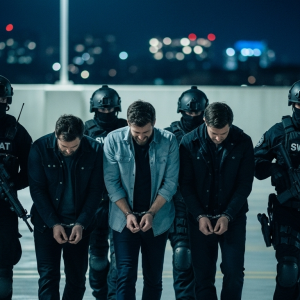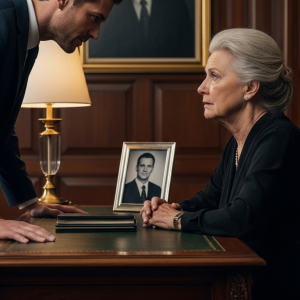The New York City subway is a beast with iron bones and a percussive heartbeat. It exhales gusts of metallic air and groans with the weight of the millions of souls it carries. Down in its belly, amidst the screech of steel on steel and the cacophony of a dozen languages, a different kind of sound could be found—if one was patient enough to listen. In the tiled artery of the Times Square-42nd Street station, a young man named Leo made his stand against the chaos.
Leo was barely into his twenties, with a face that hadn’t yet decided between the softness of boyhood and the hard lines of a man who sleeps in places he shouldn’t. His clothes were thin, his frame wiry from missed meals, but his hands were strong and sure. In those hands, he held his entire world: a cello. It was an old instrument, its dark wood scarred and bruised by time, its varnish worn away in patches. Yet, when Leo drew his bow across its strings, it produced a sound that was impossibly rich, a deep, resonant voice that spoke of ancient sorrows and fragile hopes.
He played for the river of people that flowed past him—a torrent of hurried footsteps, averted eyes, and insulated ears. For most, he was just another part of the city’s scenery, a piece of living graffiti. But not for Frank.
Frank was a man made of quiet routines and heavy sighs. As a night maintenance worker for the MTA, he was one of the city’s ghosts, emerging as the metropolis began to yawn and settle. His life was a silent loop of sweeping up the day’s debris and fixing what was broken. He was a widower, and the silence in his small Queens apartment was often louder than the roar of the 7 train outside his window.
He had first heard Leo’s music months ago. Now, it was the anchor of his shift. He would always find a reason to pause his work, leaning on his broom in a shadowy corner, and let the boy’s music wash over him. It wasn’t just the skill that captivated him; it was the raw, untamed emotion Leo poured into the instrument. Frank’s late wife, Eleanor, had been a violinist, and in Leo’s playing, he heard an echo of the passion she had for her art.
A silent, unspoken ritual formed between them. Leo would see the burly maintenance worker in his peripheral vision, a steady, unmoving presence in the chaotic station. He would sometimes play a particularly melancholic passage and glance over, seeing Frank nod slowly, his eyes distant. It was a connection forged in the shared solitude of the city at night, a silent acknowledgment that they were both there, listening to the city’s lonely heart.
Frank noticed the cello, too. It didn’t look like the student instruments he’d seen in music shops. Despite its battered appearance, it had a certain nobility. The scroll was carved with an artist’s precision, and the wood seemed to glow from within under the harsh fluorescent lights. He knew nothing about instruments, but he knew that this one was special. It sang differently. It wept differently.
For Leo, the cello was his only tether to a life he’d lost. He’d been a prodigy once, a scholarship student at Juilliard, until a family crisis had pulled the rug out from under him, forcing him onto the streets. He’d found the cello in a dusty corner of a pawn shop, paying for it with the last of his money. He didn’t know its history, only that when he played it, he felt a little less invisible. It was his voice, his shield, and his only companion.
The day had been particularly cruel. It began with a thin, sleeting rain that soaked through Leo’s worn-out coat, chilling him to the bone. The morning rush hour crowd was more aggressive than usual, their impatience leaving no room for art. A transit cop, new to the beat and eager to assert his authority, had told him to pack up, threatening a fine for loitering that Leo knew he could never pay.
He had spent the afternoon trying to find a warm place to sit, his stomach a tight, aching knot of hunger. The final blow came in the form of a crumpled letter he’d retrieved from a P.O. box—another rejection, this one from a local orchestra, the words “exceptionally high volume of applicants” a polite slap in the face. The world, it seemed, had no space for him or his music.
That night, as the station began to empty, leaving only the stragglers and the city’s nocturnal creatures, Leo felt a familiar despair settle over him. He could pack up, find a corner to curl up in, and let the cold seep into his bones. Or he could play.
He chose to play.
He didn’t play Bach or a familiar crowd-pleaser. Instead, he closed his eyes and let the day’s pain flow from his heart, through his arms, and into the strings of his cello. A new melody emerged, a piece he had been composing in his head for weeks. It was a song born of the city’s rhythm and his own sorrow. It started with a low, mournful drone, like the sound of the wind whipping through concrete canyons. It was the sound of loneliness.
Frank was on his usual rounds when the first notes reached him. He stopped, his push broom forgotten. This was different. He’d heard Leo play sad songs before, but this was something else entirely. This wasn’t a performance; it was a confession.
The melody began to build, a fragile theme of hope weaving its way through the melancholy. It was the sound of a single streetlight on a rain-slicked pavement, a moment of beauty in the overwhelming darkness. The tempo quickened, the notes becoming more urgent, more passionate, as if fighting against the encroaching despair. It was a crescendo of defiance.
A few late-night travelers, who would normally rush past, found their feet slowing. A couple on their way home from a late dinner stopped, the woman leaning her head on her partner’s shoulder. A tired nurse, her shift finally over, sank onto a bench, her eyes closed. They were all captured, suspended in the raw, powerful emotion of the music.
The final notes of the piece were heartbreakingly soft, fading into the ambient hum of the station, leaving a profound silence in their wake. For a moment, no one moved.
Frank felt a familiar ache in his chest. The music had transported him back twenty years, to a small recital hall where his Eleanor had played her heart out. He saw her face, flushed with passion, her bow dancing across the strings. This boy, this stranger in the subway, had resurrected a ghost.
On pure, unthinking impulse, driven by a desperate need to capture and hold onto this fleeting moment of grace, Frank pulled out his worn smartphone. He fumbled with the screen, his thick fingers clumsy, and hit record. He filmed Leo taking a shaky breath, a single tear tracing a path through the grime on his cheek as he acknowledged the small, captivated audience with a weary nod. He recorded the smattering of heartfelt applause and the quiet dignity with which Leo began his next piece. Frank didn’t know why he was doing it; he just knew this music deserved more than to fade into the tunnels.
When Frank got home just before sunrise, the silence of his apartment felt different. It wasn’t empty; it was filled with the ghost of the melody he had heard. He warmed up a cup of coffee, sat at his small kitchen table, and watched the video he had taken.
The phone’s camera was shaky, and the audio was far from perfect, picking up the distant rumble of a passing train. But it didn’t matter. The raw emotion of the performance transcended the low-quality recording. It had captured the magic—the way Leo’s body swayed with the music, the intense concentration on his face, the profound sadness and hope in his eyes.
Frank wasn’t a man who used social media much. His Facebook page was a sparse collection of shared articles about the Mets and birthday wishes from his daughter. But he felt a conviction he hadn’t experienced in years. The world was a noisy, often ugly place. It needed more of this.
He uploaded the video, a process that took nearly half an hour on his slow internet connection. He thought for a long time about what to write, before settling on something simple and true. He typed: “Heard this in the Times Square station around midnight. This kid’s music deserves to be heard by the world.” He tagged it with #NYCSUbwayMusic and #Cello, hit post, and went to bed, not giving it a second thought.
When he woke up that afternoon, the world had changed. His phone, usually silent, was buzzing incessantly on his nightstand. He picked it up, squinting at the screen, and saw a flood of notifications. His daughter had called him three times. He had dozens of text messages and hundreds of Facebook alerts.
Confused, he opened the app. His post, which he assumed a dozen of his friends might see, had exploded. It had a thousand shares. He refreshed the page. Ten thousand. He refreshed again. Fifty thousand. The view count was climbing at a dizzying rate: 500,000… 800,000… 1.2 million. It was like watching a tidal wave build in real time.
The comments section was a waterfall of emotion from across the globe. “This made me cry on my lunch break in London.” “I’m a professional musician and this young man has more soul than most people I see on the world’s biggest stages.” “Does anyone know who he is? We need to find him!” News outlets, music blogs, and celebrities had shared it. The video was no longer his; it belonged to the internet. It had taken on a life of its own.
That night, when Frank went to work, he was in a daze. He walked to the spot where Leo usually played, but the space was empty. A small crowd of people were gathered there, phone cameras out, hoping to catch a glimpse of the now-famous “Subway Cellist.” Frank felt a strange mix of pride and anxiety. He had wanted the world to hear, but he hadn’t considered what would happen when the world actually listened. He had lit a match, and now a forest fire was raging.
Miles away from the grime and noise of the subway, in a sprawling, silent mansion overlooking the Hudson River, Arthur Sterling was living in a self-imposed exile. Once a legendary music producer, the man who had discovered and molded some of the biggest names of the 20th century, Sterling had vanished from public life a decade ago, following the death of his wife, Isabella. His world, once filled with music, was now ruled by a quiet, suffocating grief.
His assistant, a young, tech-savvy woman named Claire, approached him cautiously as he sat in his library. “Mr. Sterling, I know you don’t like to be bothered, but there’s a video circulating online. It’s… well, I thought you should see it.”
Sterling grunted, not looking up from his book. “The internet is a cesspool of fleeting distractions, Claire. I have no interest.”
“Please, sir,” she insisted, a rare note of urgency in her voice. “It’s a cellist. In the subway. People are saying… well, his sound is remarkable.”
With an irritated sigh, Sterling gestured for her to play the video on the tablet she was holding. The shaky footage filled the screen. The familiar rumble of the subway filled the silent, dust-moted library. Then, the music began.
Sterling’s expression, initially bored and dismissive, began to shift. He sat up straighter. His eyes, usually clouded with a weary sadness, sharpened with an analytical focus he hadn’t felt in years. The boy’s technique was raw, unpolished in places, but his musicality… it was extraordinary. The phrasing, the emotional depth—it was the kind of innate talent he had spent his life searching for.
But then, his focus shifted from the boy to the instrument. His breath caught in his throat. It couldn’t be. He leaned closer, his knuckles white as he gripped the arms of his chair. “Pause it,” he commanded, his voice a hoarse whisper. “Zoom in on the cello. Near the bridge.”
Claire did as she was told, her fingers pinching the screen to enlarge the image. There, on the dark wood of the instrument, was a faint, silvery line—a uniquely shaped scratch. Sterling felt the air leave his lungs. It was a scar he knew intimately. A scar left fifty years ago when a young Isabella had accidentally scraped her cello against a stone fountain in Italy on their honeymoon.
It was Isabella’s cello. A 1712 Stradivarius, the ‘Duchess,’ which had been stolen from a secure vault a year after her death, a loss he had felt like a second amputation. He had assumed it was gone forever, sold to some private, unscrupulous collector. And now, here it was, in the hands of a homeless boy in the subway, singing again.
For the first time in ten years, the ghost of Isabella in his memory wasn’t a tragic figure; she was smiling. The music producer in him, long dormant, roared back to life. He looked at Claire, his eyes blazing with a purpose she hadn’t seen since she’d started working for him.
He pointed a trembling finger at the screen. “Find that boy,” he said, his voice low and dangerous. “I don’t care what it takes. Get me the head of my old label on the phone. Now.”
Three days later, Leo was in his usual spot, bewildered by the new attention he was receiving. People were stopping, recognizing him, filming him. It was overwhelming. As he finished a piece, a woman in an impeccably tailored business suit approached him, her expensive heels clicking with authority on the grimy floor.
“Are you Leo?” she asked, her voice calm and direct, cutting through the station’s noise.
Leo nodded nervously, clutching his cello.
She handed him a simple, elegant business card. “My name is Catherine Vance. I work for Mr. Arthur Sterling. He would like to meet with you.” The name hung in the air, a name even Leo knew belonged to a legend. He stared at her, then at the card, his world tilting on its axis.
The transition was dizzyingly abrupt. One moment, Leo was breathing the stale, damp air of the subway; the next, he was stepping out of a black car into the crisp, clean air of a world he had only ever read about. Sterling’s mansion was less a home and more a monument, a grand stone edifice surrounded by acres of manicured gardens. The poverty and anonymity that had clung to him like a second skin were being systematically destroyed.
He was led into the library where he’d been discovered. It was a cathedral of books and silence. And sitting in a large leather armchair, looking more like a retired king than a record producer, was Arthur Sterling. The man’s gaze was intense, analytical, and deeply sad.
“The music you play,” Sterling began, his voice a gravelly baritone that seemed to absorb the silence. “The piece in the video. It’s your own composition.” It was a statement, not a question.
Leo, clutching the worn case of his cello, could only nod. “I call it… ‘Underground Serenade’.”
“A fitting title,” Sterling said, his eyes flicking to the cello case. “May I?”
Nervously, Leo unlatched the case. He had cleaned the instrument as best he could, but it looked impossibly humble in the opulent room. Sterling rose and approached it not with the reverence of an admirer, but with the familiarity of a long-lost friend. He ran his fingers lightly over the wood, his touch lingering on the silvery scratch near the bridge.
“Where did you get this?” Sterling’s voice was soft, but it held the weight of an interrogation.
“A pawn shop,” Leo answered honestly. “On the Lower East Side. About two years ago. The owner said it had been sitting in his back room for years. I used every cent I had.” He braced himself for an accusation, for the dream to shatter.
Instead, Sterling looked at him, and for the first time, a flicker of something other than grief crossed his face. “You didn’t know what it was, did you, boy?”
“I knew it was special,” Leo whispered. “It… it felt alive.”
Sterling walked over to a grand fireplace, above which hung a beautiful, oil-painted portrait of a woman with dark, laughing eyes. In the portrait, she was holding the very same cello. “Her name was Isabella. My wife. She was a virtuoso. That instrument was as much a part of her as her own heart. When she died, the music… it died with her. And then, the cello was stolen.”
The pieces clicked into place in Leo’s mind with a terrifying clarity. The history of his only companion, the source of its magical voice, was a story of profound love and loss. He felt like an unwitting grave robber.
“I didn’t know,” Leo stammered, his eyes wide with horror. “I swear, I’ll give it back right now.”
Sterling turned from the portrait, his eyes locking onto Leo’s. “She would have hated that,” he said, the words sharp and clear. “She believed instruments like this weren’t meant to be possessions. They are conduits. They are meant to make music. For ten years, this house, and that cello, have been silent. You, boy, made it sing again.”
He gestured for Leo to sit. The destruction of Leo’s old life was complete. He wasn’t just a potential new artist; he was the unexpected heir to a legacy, the keeper of a ghost’s voice. Sterling didn’t just want to give him a record deal. He wanted to hear his wife’s cello sing again, in a world-class studio, played by the boy who had rescued it from silence.
Leo’s debut album, titled “Underground Serenade,” was recorded in the legendary Studio A of Sterling’s old record label. Under Sterling’s mentorship, Leo’s raw talent was honed and polished, but never tamed. The album was a sensation, a critical and commercial success that launched him from subway busker to global star almost overnight. The raw, heartbreaking melody that had been captured on a shaky phone was now an anthem of hope for millions.
He insisted on one condition in his contract: the story of the cello, of Isabella, would be told. The instrument was not his; he was merely its custodian. A significant portion of the album’s proceeds went to a new foundation established in Isabella Sterling’s name, funding music education for underprivileged children. The legacy was no longer silent; it was a symphony.
On the night of his debut concert at Carnegie Hall, the culmination of a journey that seemed more like a fairytale than reality, Leo felt a familiar wave of anxiety. The stage lights were blinding, the sold-out crowd a faceless sea. He took a deep breath and scanned the front row.
And there he was.
Frank sat in the seat of honor, a new suit replacing his MTA uniform, his face a mask of pure, unadulterated pride. He had been hailed in the press as the man with the “golden ear,” the one who had discovered Leo. He’d been given a lifetime pension by the record label as a finder’s fee, a sum that had changed his life. But that wasn’t why he was there. He was there for the music.
Leo caught his eye and gave a small, grateful nod. Frank nodded back, his eyes already welling with tears.
Leo sat, raised his bow, and the hall fell silent. He didn’t begin with a classical masterpiece. He began with the piece that started it all. The first, mournful notes of the “Underground Serenade” filled the hallowed space, the voice of Isabella’s cello soaring, rich and clear.
Frank closed his eyes, no longer in a grand concert hall, but back in the grimy, echoing cathedral of the subway station. He could hear the distant rumble of the trains and smell the damp concrete. He saw a lonely boy pouring his heart out into an old wooden box, and he saw his own act of quiet desperation, of wanting to save one beautiful thing in a world that often felt broken.
He opened his eyes and looked at the stage, at the boy who was now a star, playing for the world under brilliant, warm lights. The small, kind act had not just changed a life; it had unleashed a torrent of beauty. And as the final, hopeful notes of the serenade faded into thunderous applause, Frank smiled through his tears. The music was finally where it belonged.




